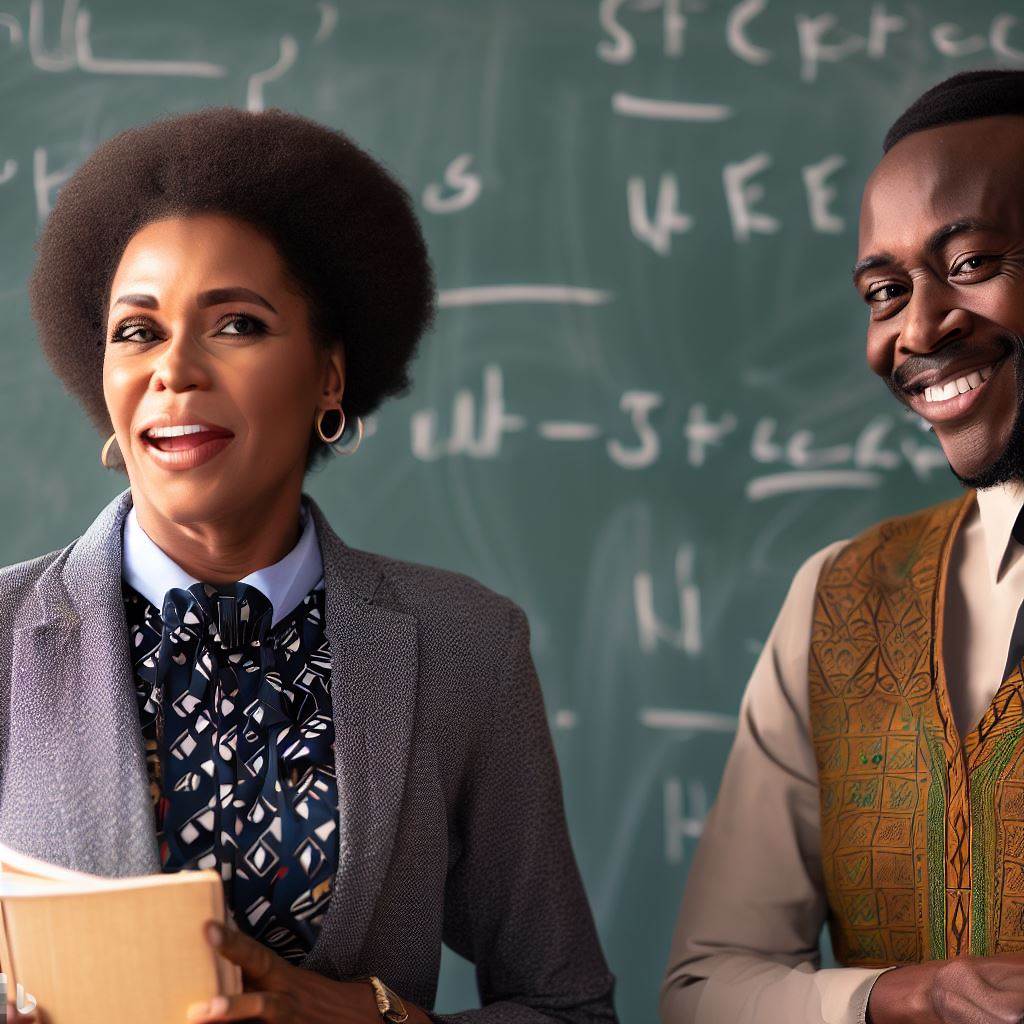Introduction
Gender dynamics play a significant role in the Nigerian teaching profession, shaping interactions and power dynamics among educators.
In this blog post, we will provide a brief overview of the Nigerian teaching profession and highlight the importance of gender dynamics.
We will also present a thesis statement to guide our exploration of this topic.
Overview of the Nigerian Teaching Profession
- Educational Backbone: Teachers shape minds, contributing to Nigeria’s development and future.
- Challenges: Inadequate resources, low pay, and overcrowded classrooms persist as hurdles.
Significance of Gender Dynamics
- Gender Imbalance: Majority of teachers are female, yet leadership roles often favor males.
- Stereotypes: Gender biases impact career progression and subject preferences for teachers.
Thesis Statement
This chapter delves into the underexplored realm of gender dynamics within Nigeria’s teaching profession, shedding light on imbalances and their repercussions.
Historical Context of the Nigerian Teaching Profession
Overview of the Colonial Era and its Impact on Education
The Nigerian teaching profession has a rich historical context that is deeply influenced by the colonial era.
During this period, Nigeria was under British colonial rule, which significantly shaped the educational system in the country.
Under British colonization, education was primarily provided by Christian missionaries who established schools to train religious leaders and promote Western education.
These schools were mainly located in urban areas and accessible to a small portion of the population.
The colonial government played a role in education by introducing a curriculum that focused on subjects like English, mathematics, and science.
This curriculum aimed to prepare Nigerian students for administrative roles in the colonial administration.
Gender Roles During that Period
During the colonial era, gender roles in Nigeria were largely influenced by traditional societal norms. Women were expected to prioritize family and domestic responsibilities, and their access to education was limited.
Girls were less likely to attend school compared to boys, as education was seen as more important for male children who were expected to become breadwinners.
This disparity in educational opportunities created significant gender gaps in the teaching profession.
Read: Insights into the Teaching Profession in Nigeria Today
Transition to Post-Colonial Nigeria and its Effect on the Teaching Profession
With Nigeria gaining independence in 1960, there were significant changes in the teaching profession.
The government took control of education, which led to the expansion of schools and increased access to education for both genders.
The post-colonial period saw a surge in the number of female teachers as more women gained access to education.
However, despite this progress, gender disparities persisted in terms of leadership positions and salary levels within the profession.
How Gender Dynamics Evolved During this Time
During the post-colonial era, gender dynamics in the Nigerian teaching profession gradually evolved.
There was a growing recognition of the importance of gender equality and efforts were made to promote women’s empowerment.
Policies were introduced to bridge the gender gap in education, such as affirmative action initiatives and the promotion of female teachers to leadership positions.
However, challenges remain in achieving true gender equality within the teaching profession.
Today, Nigerian women have made significant strides in the teaching profession but still face obstacles such as cultural norms, discrimination, and limited access to resources and professional development opportunities.
Read: Teaching Under Stress: The Experience of a Nigerian Teacher
The role of women in the Nigerian teaching profession
- Statistics and facts on the number of female teachers: In the Nigerian teaching profession, women make up a significant portion of educators.
According to recent statistics, 62% of teachers in Nigeria are women. - Challenges faced by women in pursuing teaching careers: Despite the high representation of women in the teaching profession, they still face numerous challenges.
One major obstacle is societal expectations and stereotypes. - Societal expectations and stereotypes: Women in Nigeria face pressure to prioritize their domestic roles over pursuing professional careers like teaching.
Society often reinforces gender roles and stereotypes that limit their opportunities. - The glass ceiling effect in the profession: Another significant challenge for women in the Nigerian teaching profession is the presence of the glass ceiling effect.
Many talented and qualified women struggle to progress into leadership positions.
Success stories and female leaders within the education sector
Despite these challenges, there have been remarkable success stories of women breaking barriers and becoming leaders within the Nigerian education sector.
One notable example is Mrs. Adeola Peters, who started as a primary school teacher and eventually became the principal of a renowned secondary school.
Her dedication and commitment to empowering young minds have inspired many female educators.
Another inspiring figure is Dr. Fatimah Ahmed, a university lecturer who specializes in educational psychology.
Dr. Ahmed’s research on gender dynamics in the teaching profession has shed light on the challenges faced by women and opened up conversations for policy change.
Several organizations and associations have also been established to support and advocate for women in the teaching profession.
The Nigerian Women Teachers Association (NWTA) works tirelessly to promote gender equality and provide resources for professional development.
Read: Primary Education in Nigeria: The Role of Teachers
The role of men in the Nigerian teaching profession
Statistics and facts on the number of male teachers
In the Nigerian teaching profession, men are significantly outnumbered by their female counterparts. According to a study conducted in 2020, only 25% of teachers in Nigeria are men.
These statistics reveal a gender imbalance in the profession, with women dominating the field.
Challenges faced by men in pursuing teaching careers
Men who choose to pursue teaching careers in Nigeria often face various challenges.
One of the main challenges is societal expectations and stereotypes. Teaching is often seen as a feminine profession, and men who choose to enter this field may face criticism or judgment from their peers and families.
Another challenge is the prejudice and discrimination men may encounter from students, parents, and even their colleagues.
Due to traditional gender roles, some individuals believe that men are not fit for nurturing or educating children.
Societal expectations and stereotypes
Societal expectations and stereotypes play a significant role in shaping the gender dynamics in the Nigerian teaching profession.
Traditional gender roles dictate that women are more nurturing and caring, leading to the perception that teaching is better suited for women. Men who deviate from this norm may face scrutiny and resistance.
These expectations and stereotypes limit the opportunities for men who wish to pursue teaching careers, reinforcing the gender imbalance in the profession.
Analysis of gender bias and discrimination that men may face
Gender bias and discrimination are prevalent in the Nigerian teaching profession, specifically targeting male teachers.
Some schools or educational institutions may be hesitant to employ male teachers due to the belief that they are more likely to engage in misconduct or be inappropriate with students.
Additionally, male teachers may be overlooked for leadership positions and career progression due to biases and assumptions about their abilities.
Success stories and male leaders within the education sector
Despite the challenges and barriers, there are many success stories and male leaders within the Nigerian education sector.
Many men have persevered and succeeded in their teaching careers, breaking societal stereotypes and proving their competence and dedication.
Male leaders in education have played instrumental roles in advocating for gender equality, challenging biases, and creating inclusive environments within schools.
These success stories and male leaders serve as inspiration and motivate other men to pursue teaching careers, despite the obstacles they may face.
In fact, the role of men in the Nigerian teaching profession is essential yet faced with numerous challenges.
The low representation of male teachers, societal expectations and stereotypes, gender bias, and discrimination all contribute to the gender dynamics within the profession.
However, by acknowledging these issues and promoting inclusivity, the education sector can create a more balanced and diverse teaching workforce.
Read: Understanding the Unions of Teachers in Nigeria: A Detailed Analysis

Addressing gender dynamics in the Nigerian teaching profession
Programs and initiatives aimed at promoting gender equality
- Introduction of scholarships and mentorship programs to encourage more women to enter the teaching profession.
- Implementation of affirmative action policies that ensure equal opportunities for men and women in teaching positions.
- Creation of awareness campaigns to challenge gender stereotypes and promote the value of male and female teachers.
Advantages of a more gender-balanced teaching workforce
- Diverse perspectives and teaching styles that cater to the needs of all students, regardless of their gender.
- Improved role modeling for students as they see both men and women in leadership positions within the education system.
- Fostering a supportive and inclusive environment that values gender equality, reducing gender-based discrimination and inequality.
Read: A Comprehensive Overview of Special Education in Nigeria
Importance of inclusive policies and practices in schools
- Development and implementation of gender-sensitive curriculum and teaching materials that challenge traditional gender roles.
- Creation of safe spaces in schools for students to openly discuss and learn about gender equality and respectful relationships.
- Adapting policies to accommodate the needs and experiences of both male and female teachers, promoting equal opportunities for professional growth.
Strategies for creating a supportive environment for both male and female teachers
- Providing mentoring programs and professional development opportunities for teachers to enhance their skills and confidence.
- Addressing gender biases and stereotypes through training sessions and workshops for school staff and administrators.
- Encouraging open communication and collaboration between male and female teachers to foster a supportive work culture.
Recommendations for further improvement and progress
- Conducting regular assessments and evaluations to monitor progress in promoting gender equality in the teaching profession.
- Partnering with international organizations and experts to exchange best practices and strategies for addressing gender dynamics.
- Encouraging research and data collection to identify specific challenges faced by male and female teachers in Nigeria.
- Engaging parents and communities in promoting gender equality in education through seminars and awareness campaigns.
In general, addressing gender dynamics in the Nigerian teaching profession requires a comprehensive approach that involves implementing programs and initiatives, recognizing the advantages of gender balance, adopting inclusive policies and practices, creating a supportive environment, and continuously striving for improvement.
By actively working towards gender equality, Nigeria can ensure that all teachers, regardless of their gender, can thrive and contribute effectively to the education sector.
Read: The Importance of Continuing Education for Nigerian Teachers
Discover More: The Role of NGO’s in Nigerian Education Careers
Conclusion
The gender dynamics in the Nigerian teaching profession have been examined, highlighting the underrepresentation of female teachers and the prevalent gender stereotypes.
By acknowledging the gender disparities and challenging the stereotypes, we can create a more inclusive and diverse educational environment that benefits both students and teachers.
It is imperative for policymakers, educational institutions, and individuals to take proactive steps towards gender equality in the teaching profession. Let us work together to uphold equal opportunities and promote a balanced representation in this vital field.




